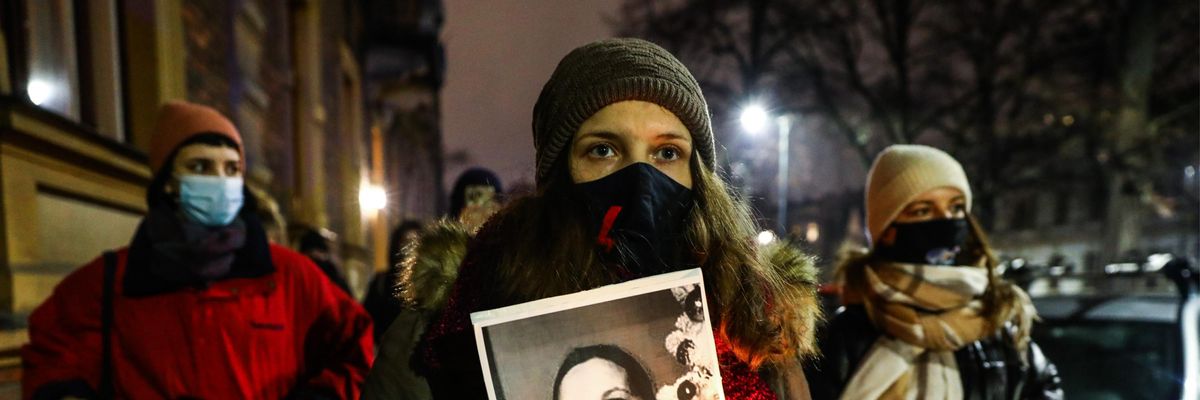Protests erupted in Poland this week after a 37-year-old woman who was denied an abortion died just days before the one-year anniversary of a Polish court further restricting reproductive rights in the country.
"Time and time again, we see that abortion restrictions prevent access to lifesaving reproductive healthcare."
Relatives of Agnieszka T., the mother-of-three who died Tuesday, say the Polish government has "blood on its hands."
That sentiment has been echoed by supporters of reproductive freedom worldwide, who argue--as the Irish group Leitrim for Choice put it--that "Poland is killing women."
The London-based MSI Reproductive Choices, formerly known as Marie Stopes International, tweeted: "Time and time again, we see that abortion restrictions prevent access to lifesaving reproductive healthcare. Safe abortion saves lives."
"We send our thoughts to Agnieszka's family and solidarity to those protesting Poland's abortion ban," said the group--which provides sexual and reproductive healthcare in over three dozen countries--adding the hashtag #AniJednejWiecej, which is Polish for "not one more."
Agnieszka was admitted to the Blessed Virgin Mary hospital in Czestochowa, Poland last month, The Guardianreports. She was in the first trimester of a twin pregnancy, but both fetuses died several days apart, after which doctors finally performed an abortion.
According to the newspaper:
The family say that the doctors refused to terminate the pregnancy earlier, citing Poland's abortion legislation. "Her husband begged the doctors to save his wife, even at the cost of the pregnancy," Agnieszka's twin sister, Wioletta Paciepnik, said on Tuesday.
After the termination, Agnieszka was moved from the gynecological ward and her health continued to deteriorate. Her family suspect that she died of sepsis but the cause of death was not identified in a statement released by the hospital.
Euronewsreports that "Polish judicial authorities say they are investigating the woman's death and whether medical staff exposed her to unnecessary risks."
Meanwhile, "hundreds of people gathered on Wednesday evening at the Constitutional Tribunal and the headquarters of the ruling Law and Justice (PiS) party to protest against the tribunal's 2020 anti-abortion ruling," according toEuractiv.
The October 2020 ruling, which took effect the following January, outlawed abortions in cases of "severe and irreversible fetal defect or incurable illness that threatens the fetus' life."
Now, "abortion is only permitted in situations of risk to the life or health of a pregnant woman, or if a pregnancy results from rape," Human Rights Watch (HRW) explained Wednesday. "In practice, however, it is almost impossible for those eligible for a legal abortion to obtain one."
HRW also called the tribunal "discredited," pointing out that the European Court of Human Rights and the European Commission have found that it "does not meet fair trial requirements due to its lack of independence from the legislative and the executive powers."
The Guardian notes that more protests for the days ahead are planned in Agnieszka's hometown of Czestochowa.
"We continue to protest so that no one else will die," said organizer Marta Lempart. "The Polish abortion ban kills. Another person has died because the necessary medical procedure was not carried out on time."
The Warsaw-based Federation for Women and Family Planning (Federa), which fights for reproductive health and rights, also highlighted Thursday that Agnieszka isn't the only person who has died in the past year:
From the very announcement of the ruling of the flawed Constitutional Tribunal the Federation for Women and Family Planning has warned that the ban on abortion would result in the deaths of patients and, unfortunately, our predictions came true. The information about the death of Izabela from Pszczyna shook the whole country and led hundreds of thousands of people to the streets, with a slogan--Not One More (AniJednejWiecej). Izabela's face has become a symbol of the fight for the right to abortion in Poland, but she is not the only victim of this bloody law. We know that Anna from Swidnica and Agnieszka from Czestochowa have also fallen victims of the law--the latter died just two days before the first "anniversary" of the law that most likely contributed to her death. We dread to think of how many women lost their health and lives as a result of this inhuman ban we have not even heard of.
"The politicized tribunal has caused hell for women in Poland that must end as soon as possible--before another one of us dies," Federa added. "We demand the immediate decriminalization of abortion, immediate elaboration of transparent hospital procedures, and ensuring that Polish women have access to the full scope of reproductive health services."
Since last January, over 1,000 people have turned to the European Court of Human Rights to challenge Poland's abortion restrictions, according to HRW--one of nine human rights organizations that have filed third-party interventions in multiple cases.
"Restrictive abortion laws such as Poland's are contrary to international and European human rights standards and public health guidelines," the groups said Wednesday. "They compromise women's freedom, dignity, health, and lives. Our organizations' interventions seek to highlight critical human rights aspects of such restrictive laws, and we are proud to support efforts to hold Poland accountable for these ongoing human rights violations."

